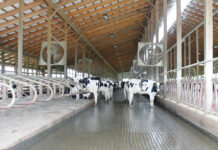
STRASBURG, Ohio — Keeping to the plan, following best practices and being a good neighbor could protect farmers against nuisance lawsuits over manure.
Peggy Kirk Hall, director of The Ohio State University’s agricultural and resource law program, talked about nuisance liability at the 2019 Manure Science Review Aug. 7.
The annual review hosted more than 50 people at JIMITA Holsteins and had presentations on a variety of topics including manure nutrients, application rules, cover crops and applying manure to emerging crops.
There were also field demonstrations on stockpiling, silage leachate and spreader calibration.
Taking risks
Last year, 26 nuisance lawsuits were filed in North Carolina against hog operations, Kirk Hall said. Some of the verdicts have gone in favor of the plaintiffs and millions of dollars have been awarded.
This has people wondering if the same thing could happen in Ohio, Kirk Hall said. The answer is it could. And if the lawsuits will be awarded in favor of the plaintiff all depends on the farmer and their operation.
“This is a risk that we in the agricultural community live with all the time. The possibility that what we do will be perceived as a nuisance to someone,” Kirk Hall said.
On the defensive
In Ohio, nuisance is legally described as creating an unreasonable interference with one’s right to use and enjoy their property. The most common agricultural nuisance complaint is manure.
“People are afraid of manure,” Kirk Hall said.
Ohio law provides affirmative defenses for nuisance lawsuits.
An affirmative defense can defeat a claim in a court of law. It doesn’t prevent someone from filing a lawsuit, but it provides a defense the farmer can raise in response to it.
If a farmer successfully proves an affirmative defense, the court will dismiss the suit.
However, for an affirmative defense to work, a farmer must raise one of the particular statues as a defense and then prove all elements of it.
This is where having an attorney experienced in agricultural law would be helpful, Kirk Hall said.
Right to farm
One of the defenses is in the Ohio Right to Farm law. This gives a defense for farmers when a nonfarmer moves nearby and then brings a nuisance lawsuit against the existing farm.
Kirk Hall said there were some recent changes to the law made by the budget bill signed in July by Gov. Mike DeWine.
To be protected under this program, agricultural activities must be taking place on qualifying land, must have been happening first and must not be in conflict with laws and rules relating to the alleged nuisance or in accordance with generally accepted agricultural practices.
Qualifying land now includes land enrolled as an agricultural district, CAUV land or land under a lease.
The change also clearly defined that “agricultural activities” means common agricultural practices, including: cultivation of crops or changing crop rotation, raising livestock, entering into and operating under a livestock contract and the storage and application, commercial fertilizer or pesticides.
It also includes a change a corporate structure or ownership and an expansion, contraction or change in operation.
That last part answers a question some had about what happened if a farm changed hands between generations or changed owners or if the operation changed entirely.
Stick to the plan
Another defense is the Ohio Agricultural Pollution Abatement law. The abatement program encourages farmers to develop and operate under an operation and management plan.
For farmers who have one of these plans, the law provides an affirmative defense to a private civil lawsuit for nuisance based on a claim of agricultural pollution.
The farmer must prove that they have an approved operation and management plan and that they are operating under and in substantial compliance with an approved plan.
Substantial compliance doesn’t mean the farmer has to be perfect, Kirk Hall said. They have to be doing their best to stick to the plan.
The Ohio Livestock Environmental Permitting Program defends owners and operators of confined animal feeding facilities. To raise this defense, the facility must be in compliance with best management practices and not violating federal, state or local laws governing nuisances.
Reducing risk
Farmers can also do try to reduce their risk when it comes to potential nuisance lawsuits.
Staying in compliance with the plan is important.
“Getting to the point where I can say ‘I’m a good operator. I am doing the best I can,’” Kirk Hall said.
Following best management practices and generally accepted agricultural practices, having good documentation and having insurance can also help.
Being a good neighbor is also critical. Building up a good relationship with neighbors so they’re informed about farming and feel their property rights are being respected can help, Kirk Hall said.
For more information on nuisance defenses and agricultural law, visit www.farmoffice.osu.edu
(Reporter Rachel Wagoner can be contacted at 800-837-3419 or rachel@farmanddairy.com.)











